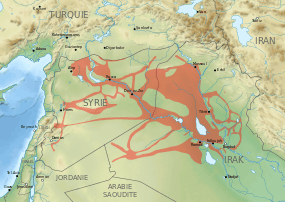Proto-state

A proto-state, quasi-state[1] or state embryo is a political entity that has some of the characteristics of a state but is not considered fully established. The term is often used to describe Islamist militant groups that exercise some territorial control,[2] particularly the Islamic State of Iraq and the Levant.[1][3][4][5][6][7]
Proto-states are not able to exert their national sovereignty entirely because of the fault of institutions and may be not recognised by the international community. Nowadays, most of the proto-states have appeared because of failures in the previous State (failed state) or the failed attempt of impose a State to a ethnic minority geographically concentrated. They use to be in permanent war and have little wealth. Their population use to be reduced.[8] The most important case is the Islamic State.[9][10][11] Although many people consider it an insurgent terrorist group, in fact it is a proto-state: it owns a bureaucracy, is able to exert a legal monopoly —even collecting taxes— and has an army. It is a totalitarian proto-state that finances itself by mafia methods and attracts Muslims of other countries.[12] Other examples are postcolonial Mali, early Kosovo[8] and Palestine.[13]
See also
References
- 1 2 "How the Islamic State Declared War on the World". Foreign Policy. Retrieved 2016-07-20.
- ↑ Lia, Brynjar. "Understanding Jihadi Proto-States". Perspectives on Terrorism. 9 (4). ISSN 2334-3745.
- ↑ "The caliphate cracks". The Economist. ISSN 0013-0613. Retrieved 2016-07-20.
- ↑ "The Islamic State: More than a Terrorist Group?". E-International Relations. Retrieved 2016-07-20.
- ↑ "The Islamic State Paradox". Retrieved 2016-07-20.
- ↑ Thompson, Mark. "ISIS Marks First Anniversary". TIME.com. Retrieved 2016-07-20.
- ↑ "The Islamic State of Iraq Attempts to Create a State in Syria and Iraq". www.washingtoninstitute.org. Retrieved 2016-07-20.
- 1 2 Torreblanca, José Ignacio (12 July 2010). "Estados-embrión". El País (in Spanish). Retrieved 18 March 2016 – via http://www.elpais.com/.
- ↑ Segurado, Nacho (16 April 2015). "¿Por qué Estado Islámico le está ganando la partida a los herederos de Bin Laden?". 20 minutos (in Spanish). Retrieved 12 March 2016 – via http://www.20minutos.es/.
- ↑ Rengel, Carmen (5 April 2015). "Javier Martín: "El Estado Islámico tiene espíritu de gobernar y permanecer"" (in Spanish). Retrieved 12 March 2016 – via http://www.huffingtonpost.es/.
- ↑ "Islamic State: The struggle to stay rich - BBC News". BBC News. Retrieved 17 March 2016.
- ↑ Martín Rodríguez 2015, p. 15.
- ↑ Jaulmes, Adrien. "Ramallah, capitale d'un proto-État". Le Figaro (in French). Retrieved 17 March 2016.
Bibliography
- Martín Rodríguez, Javier (2015). Estado Islámico. Geopolítica del Caos [Islamic State. Chaos geopolitics] (in Spanish) (3rd ed.). Madrid,
 Spain: Los Libros de la Catarata. ISBN 978-84-9097-054-6. Retrieved 1 March 2016. ISBN 978-84-9097-008-9
Spain: Los Libros de la Catarata. ISBN 978-84-9097-054-6. Retrieved 1 March 2016. ISBN 978-84-9097-008-9